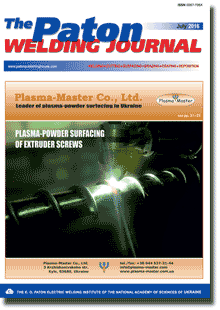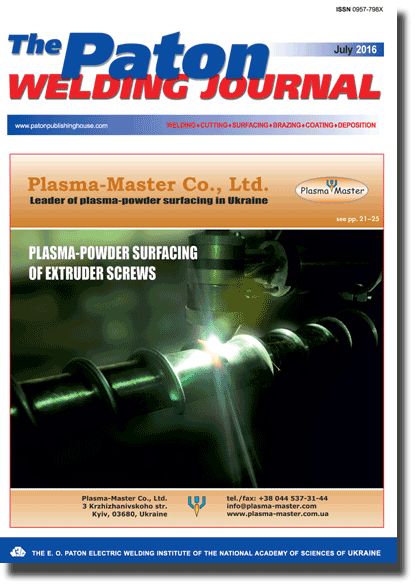| 2016 №07 (09) |
DOI of Article 10.15407/tpwj2016.07.01 |
2016 №07 (02) |

The Paton Welding Journal, 2016, #7, 2-7 pages
Strengthening phases, structure and properties of low-alloy steel modified welds
V.V. Golovko, L.I. Markashova, O.S. Kushnaryova And V.V. Zhukov
E.O. Paton Electric Welding Institute, NASU 11 Kazimir Malevich Str., 03680, Kiev, Ukraine. E-mail: office@paton.kiev.ua
Abstract
Effect of dispersoid inoculants (phase inclusions) in form of TiC, SiC and ZrO2 refractory compounds on kinetics of structural transformations in weld metal of high-strength low-alloy steels was investigated. Effect of the inoculants of different type on displacement of bainite transformation into area of higher temperatures is shown. Electron microscopy is used to analyze the nature of structural-phase changes in formation of bainite structure, i.e. peculiarities of fragmentation, distribution of dislocation density and morphology of carbide phase precipitation. The estimations of specific contribution of all structures and their parameters (phase composition, grain, subgrain and dislocation structures etc.) on carried change of strength characteristics and crack resistance of weld metal at inoculation of disperse phase inclusions were out. The optimum composition was determined for dispersoid inoculants used in welding of high-strength low-alloy steels. They provide for necessary mechanical properties of welded joints, including their crack resistance. 14 Ref., 7 Figures, 4 Tables.
Keywords: structure of high-strength steels, welded joints, alloying, phase precipitates, dislocations, strengthening factors, local internal stresses
Received: 02.02.16
Published: 02.08.16
References
- Flik, A. (2014) Strategic assessment of prospects in metallurgy. Metally, 6, 81–84.
- Ritterbach, B. (2014) Main tendencies of research development in ferrous metallurgy. Ibid., 9, 75–78.
- Gorynin, I.V. (2008) Sparcely-alloyed steels with nanomodified structure for service under extreme conditions. Voprosy Materialovedeniya, 2, 7–12.
- Amondarain, Z., Aribas, M., Arana, J.L. et al. (2013) Mechanical properties and phases derived from TiO2 nanopowder inoculation in low carbon steel matrix. Materials Transact., 54(10), 1867–1876. https://doi.org/10.2320/matertrans.M2013073
- Zhang, L., Thomas, B. (2006) State of the art in the control of inclusions during steel ingot casting. and Mater. Transact. B, 37(10), 733–761. https://doi.org/10.1007/s11663-006-0057-0
- Grong, O., Kolbeinsen, L., Eijk, C. et al. (2006) Microstructure control of steels through dispersoid metallurgy using novel grain refining alloys. ISIJ Int., 46(6), 824–831. https://doi.org/10.2355/isijinternational.46.824
- Oryshchenko, A.S., Khlusova, E.I., Golosienko, S.A. (2014) Principles of alloying and requirements to technological processes of production of high-strength hull steels of new generation. Voprosy Materialovedeniya, 78(2), 9–25.
- Cherepanov, A.N., Afonin, Yu.V., Orishich, A.M. et al. (2010) Effect of nanodispersed powders on joint properties in CO2-laser welding of carbon steel. In: of 6th All-Union Conf. on Mechanics of Inhomogeneous Materials and Fracture, 109.
- Gregg, J.M., Bhadeshia, H.K.D.H. (1997) Solid-state nucleation of acicular ferrite on minerals added to molten steel. Acta Materialia, Vol. 45, Issue 2, 739–748. https://doi.org/10.1016/S1359-6454(96)00187-5
- Golovko, V.V., Stepanyuk, S.N., Ermolenko, D.Yu. (2015) Effect of titanium-containing inoculants on structure and properties of weld metal of high-strength low-alloy steels. The Paton Welding J., 2, 14–18. https://doi.org/10.15407/tpwj2015.02.03
- Markashova, L.I., Alekseenko, T.A., Berdnikova, E.N. et al. (2011) Role of structure in optimization of strength, plasticity and crack resistance properties of welded joints. In: Stroitelstvo, Materialovedenie, Mashinostroenie, Issue 58, 446–452.
- Gorynin, V.I., Kondratiev, S.Yu., Olenin, M.I. et al. (2014) Concept of carbide designing of higher cold resistance steels. Metallovedenie i Termich. Obrab. Metallov, 712(10), 32–38.
- Markashova, L.I., Poklyatsky, A.G., Kushnaryova, O.S. et al. (2014) Structure and service properties of welded joints of complexly-doped alloys. In: of 7th Int. Conf. on Mathematical Modelling and Information Technologies in Welding and Related Processes (Odessa, Ukraine, 15–19 Sept. 2014), 19–20.
- Markashova, L.I., Shelyagin, V.D., Kushnaryova, O.S. et al. (2015) Effect of technological parameters of laser and laser-plasma alloying on properties of 38KhN3MFA steel layers. The Paton Welding J., 5/6, 124–129. https://doi.org/10.15407/tpwj2015.06.28
Suggested Citation
V.V. Golovko, L.I. Markashova, O.S. Kushnaryova And V.V. Zhukov (2016) Strengthening phases, structure and properties of low-alloy steel modified welds. The Paton Welding J., 07, 2-7.The cost of subscription/purchase order journals or individual articles
| Journal/Currency | Annual Set | 1 issue printed |
1 issue |
one article |
| TPWJ/USD | 384 $ | 32 $ | 26 $ | 13 $ |
| TPWJ/EUR | 348 € | 29 € | 24 € | 12 € |
| TPWJ/UAH | 7200 UAH | 600 UAH | 600 UAH | 280 UAH |
| AS/UAH | 1800 UAH | 300 UAH | 300 UAH | 150 UAH |
| AS/USD | 192 $ | 32 $ | 26 $ | 13 $ |
| AS/EUR | 180 € | 30 € | 25 € | 12 € |
| SEM/UAH | 1200 UAH | 300 UAH | 300 UAH | 150 UAH |
| SEM/USD | 128 $ | 32 $ | 26 $ | 13 $ |
| SEM/EUR | 120 € | 30 € | 25 € | 12 € |
| TDNK/UAH | 1200 UAH | 300 UAH | 300 UAH | 150 UAH |
| TDNK/USD | 128 $ | 32 $ | 26 $ | 13 $ |
| TDNK/EUR | 120 € | 30 € | 25 € | 15 € |
AS = «Automatic Welding» - 6 issues per year;
TPWJ = «PATON WELDING JOURNAL» - 12 issues per year;
SEM = «Electrometallurgy Today» - 4 issues per year;
TDNK = «Technical Diagnostics and Non-Destructive Testing» - 4 issues per year.


